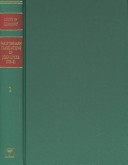John Locke (1632-1704), the father of British empiricism, is also famous for his writings on politics, education, and religion. During his lifetime, he had a great influence on the major thinkers in Britain and mainland Europe. In Germany his works on tolerance and on the limits of human knowledge were especially important. They supplied central arguments against the prevailing scholasticism of German school metaphysics. Since most German authors of the 18th century lacked a good command of the English language, there was a great need for translations. Through these translations, Wolff, Endelssohn and the Neologians around Reimarus and Lessing, were just as much influenced by Locke as by Immanuel Kant. Indeed the German Enlightenment is not intelligible without taking note of the early translations of Locke reprinted here. This eight-volume collection contains the most significant and widely disseminated 18th-century German translations of Locke's main works: his "Epistola de Tolerantia", "Of the Conduct of the Understanding", "An Essay Concerning Human Understanding", "Two Treatises of Government", "Some Thoughts Concerning Education" and "The Reasonableness of Christianity".
Also included is the first Latin translation of Locke's Essay "Concerning Human Understanding" the edition very likely read and used by Kant. Most of these books include informative and prefaces or commentaries by the translators. This set, introduced in German by Konstantin Pollok, should be a useful resource for scholars of the German Enlightenment and those interested in the development and influence of British empiricism.
- ISBN10 1843710927
- ISBN13 9781843710929
- Publish Date 5 January 2004
- Publish Status Out of Print
- Out of Print 26 February 2016
- Publish Country GB
- Publisher Bloomsbury Publishing PLC
- Imprint Thoemmes Continuum
- Edition 1864-93 ed
- Format Hardcover
- Pages 2280
- Language English
